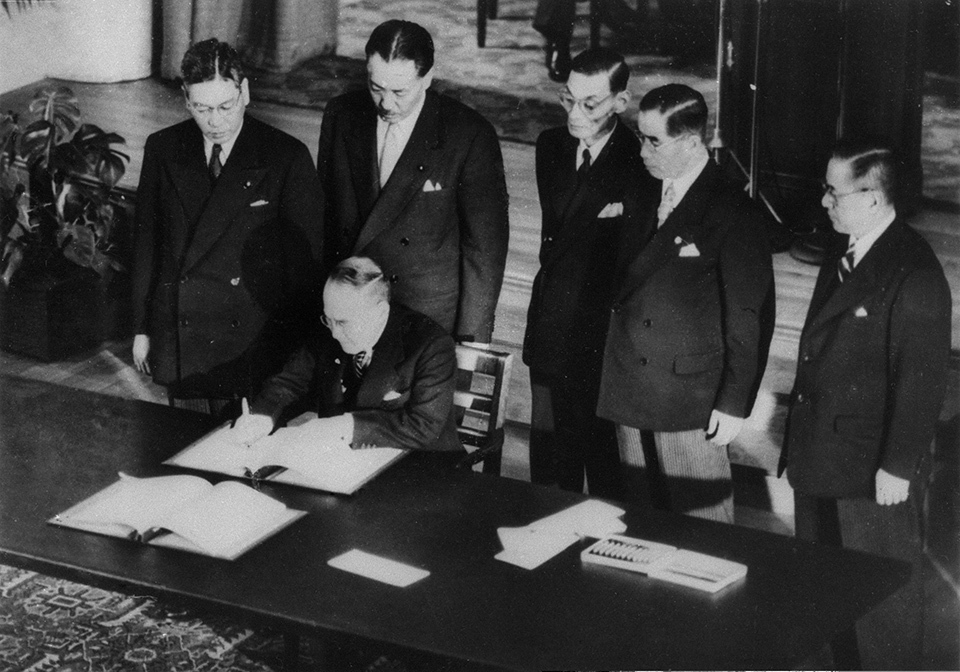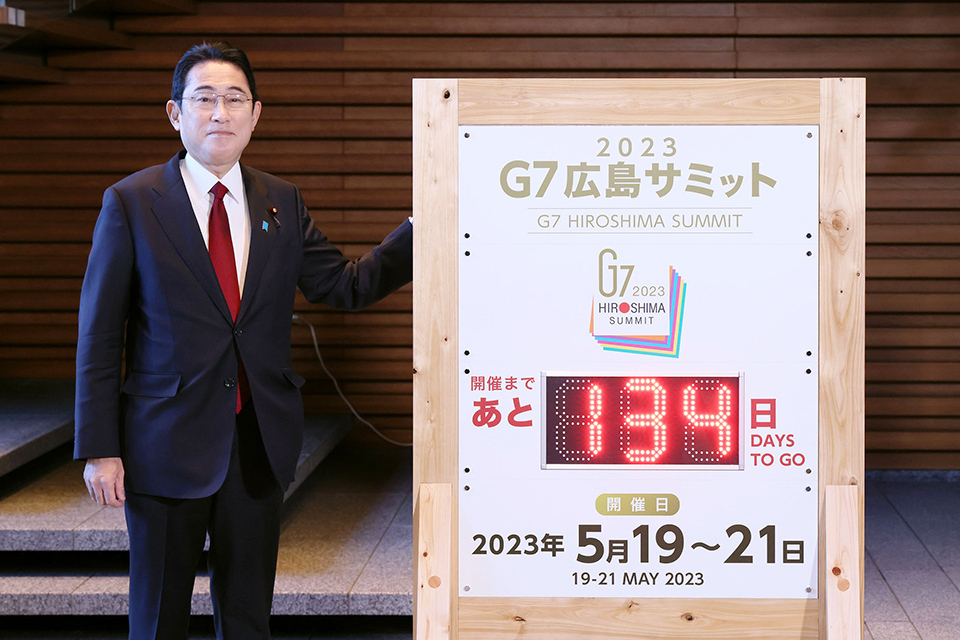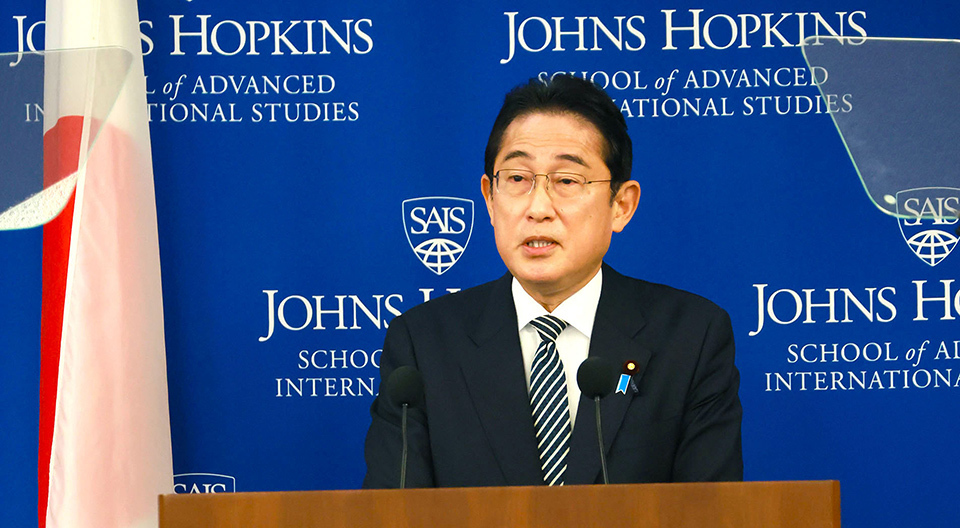JANUARY 13, 2023
Prime Minister Kishida speaks at the Johns Hopkins University School of Advanced International Studies. He reflected on last year’s decisions to change both Japan’s policy toward Russia and its postwar security policy as “very heavy decisions with consequential impacts on the future of Japan and the world.”
Shortly after the start of Japan’s G7 Presidency in 2023, Prime Minister Kishida visited France, Italy, the United Kingdom, Canada, and the United States. During these visits, on January 13, he delivered the first speech by a Japanese prime minister at the Johns Hopkins University School of Advanced International Studies in the United States in 40 years. He spoke about Japan’s decisions at a turning point in history as follows.
Three Key Points
Now, I have three key messages to deliver to you in my speech today.
First, the international community is at a historic turning point. The free, open, and stable international order that we have dedicated ourselves to upholding is now in grave danger.
Second, Japan is resolved to proactively create peace and prosperity and a free and open order worldwide.
Third, in the course of undertaking such efforts, Japan and the United States, as the most important ally and closest of friends, need to engage in further strengthening our bond.
My Two Major Decisions in 2022
In 2022, I made two major decisions in Japan’s foreign and security policy.
One is the shift in our policy toward Russia in response to its aggression against Ukraine. Another is the shift in Japan’s postwar security policy by formulating the three key documents at the end of last year: the National Security Strategy, National Defense Strategy, and Defense Buildup Program. I believe that these decisions were right for our nation and beyond around the globe.
(1) Japan’s Decisions following Russia’s Aggression against Ukraine
Russia’s aggression against Ukraine has marked the complete end of the post-Cold War world.
This is a moment that will transform history.
This is a critical moment, in fact, a moment of truth for Japan.
The future of the international community rests on how we respond to this aggression.
If we let this unilateral change of the status quo by force go unchallenged, it will happen elsewhere in the world, including Asia.
It is Japan that must rise to this challenge to take action to defend our freedom and democracy.
With this in mind, Japan decided to make a major shift in our existing policy toward Russia and then put in place strict sanctions against Russia. We were also among the first in providing humanitarian assistance to Ukraine. Our nation is the sole representative of Asia in the G7. Japan’s participation in the measures against Russia transformed the fight against Russia’s aggression against Ukraine from a Trans-Atlantic one to a global one.
(2) Japan’s Decisions for a Major Shift in Our Security Policy
The year 2022 marked the 70th anniversary of the entry into force of the Japan-U.S. Security Treaty in 1952. Today, both Japan and the United States are facing a severe and complex security environment as never before in East Asia and the Indo-Pacific since the end of WWII.
I am serving as the Prime Minister at this juncture of history’s turning point and amidst a national crisis for Japan. I have a mission to firmly defend our nation and the Japanese people. With this determination, and for the sake of reinforcing our diplomatic capabilities to ensure international peace and security, I made the decision to transform our postwar security policy in order to first bolster our own foundation by implementing the following:
- making the level of our budget, for both the fundamental reinforcement of defense capabilities and complementary initiatives, reach 2% of the current GDP,
- possessing counterstrike capabilities,
- improving response capabilities in the field of cybersecurity and
- stepping up our defense posture in the Southwest region of Japan
I am convinced that this decision represents one of the most historically critical milestones for strengthening the alliance, following such precedents as the conclusion of the Japan-U.S. Security Treaty by Prime Minister YOSHIDA Shigeru, the revision of the Treaty by Prime Minister KISHI Nobusuke, and the Legislation for Peace and Security by Prime Minister ABE Shinzo.
As you are all aware, Japan’s postwar status of a peace loving nation has not changed in the slightest. Japan will continue to be a “model citizen” of the world.
I will further double down on our diplomatic efforts this year, building on the achievements from the previous year. I am also resolved to make the most realistic judgements, bearing in mind what is called for in this era, and am resolved to carry forward a “realism diplomacy for a new era.”
Furthermore, let me reaffirm the two points, bridging what has changed and what has not changed; namely, the realistic view that diplomacy needs to be backed by defense capabilities and that reinforcing defense capabilities will also lead to persuasiveness in carrying out our diplomatic efforts, as well as the importance of the will of each and every citizen to proactively defend the country as precisely evidenced by the Ukrainian people at this moment in time. As I just outlined, Japan is going through considerable evolutions while always striving to harmonize the ideal and the reality. Going forward, you should be able to consider Japan as an even more reliable partner for all of you.

In 1951, former Prime Minister YOSHIDA Shigeru signed the Japan-U.S. Security Treaty. In 2022, over 70 years later, Prime Minister Kishida decided to make a major shift in postwar security policy by revising the National Security Strategy, National Defense Strategy, and Defense Buildup Program. THE MAINICHI NEWSPAPERS / AFLO
Addressing Future Challenges
Next, allow me to move to discuss the challenges ahead.
Let me now lay out three key points.
First, strengthening the unity of like-minded countries, especially the G7.
Second, relations with those referred to as “the Global South.”
Third, relations with China, which is the most central challenge for both Japan and the United States.
(1) Strengthening the Unity of Like-minded countries, especially the G7
The G7 is tied together on the basis of common values, and this is the group having functioned most effectively in the aftermath of Russia’s aggression against Ukraine.
We need to rally together first to maintain international peace and to resolve global economic crises, and other global challenges. In particular, it is absolutely imperative for Japan, the United States, and Europe to stand united in managing our respective relationship with China. Japan’s concept of a “Free and Open Indo-Pacific,” known as FOIP, has gained support from many like-minded countries, including the members of the G7.
In May, I will be hosting the G7 Summit in Hiroshima. As the Presidency, I will demonstrate the G7’s determination with a weight that reflects the historical significance:
- to resolutely reject Russia’s ongoing armed aggression, threats by nuclear weapons, and attempts to overthrow the international order,
- to give unwavering support to Ukraine,
- not to accept any unilateral changes to the status quo by force in any region, and
- to firmly preserve the rule of law and a free and open international order.
For us to make progress on this issue, a relationship of trust with our ally, the United States, is essential. To this end, I will also be working closely in concert with President Biden.

The countdown-board lighting ceremony for the G7 Hiroshima Summit was held in January. Prime Minister Kishida stated that he would facilitate candid discussions among the G7 Leaders as Chair to articulate ideas and plans for the future.
(2) Relations with those Referred to as “the Global South”
Relations with those referred to as “the Global South” offer us important challenges and opportunities.
We need to be more committed to our values, and at the same time, when engaging with the Global South, we need to remain humble while putting aside preconceptions and then have a firm understanding of their respective historical and cultural backgrounds. On that basis, there is a greater imperative for us to share the principle that the international community should be driven by rules, not by force.
Ever since taking office as the Prime Minister, I have consistently undertaken efforts to advance Japan’s relations with the Global South.
Among them, Southeast Asian countries are the closest and most crucial partners for Japan. A “Free and Open Indo-Pacific,” FOIP, and the ASEAN Outlook on the Indo-Pacific, AOIP, resonate with each other. I will be soon upgrading the vision of a FOIP. I will also host the ASEAN-Japan Commemorative Summit in Tokyo around December this year. I hope to demonstrate that Japan’s ties with Southeast Asian countries constitute a core element of peace and prosperity in the Indo-Pacific region.
Let me also note the importance of the relationship with India. India is this year’s G20 Presidency and a partner with shared fundamental values and strategic interests. We will further enhance the “Japan-India Special Strategic Global Partnership,” forged between our two countries, and continue to work together in pursuit of a FOIP.
Furthermore, Japan will move forward with our diplomatic engagements with the regions of South Asia, Pacific Island countries, Africa, the Middle East, Latin America and the Caribbean, Central Asia and the Caucasus.
In this regard, I would like to highlight the significance of strengthening the functions of the United Nations, including Security Council reform. Today, trust in the UN is at risk due to Russia’s aggression. Japan is taking up a two-year term on the Security Council as a non-permanent member starting this month. We will engage in taking on efforts to materialize the movement for Security Council reform, as well as to further strengthen the General Assembly, where all nations are represented.
(3) Relations with China
Next is China.
In the National Security Strategy, I described the challenge posed by China as one that “Japan should respond with its comprehensive national power and in cooperation with its allies, like-minded countries and others.” China needs to make a strategic decision that it will abide by the established international rules and that it cannot and will not change the international order in ways that are contrary to these rules. Efforts to achieve will need to be long-lasting. Along the way, we will never allow any attempts to unilaterally change the status quo by force, and we will reinforce our deterrence. With that ensured, we then hope to contribute to ensuring international peace and stability, including in the Indo-Pacific region, together with China, and cooperate on shared challenges. Thus, we need to manage our relationship peacefully. This is the key to determining a success or failure of statesmanship in this era.
Last November, I held a meeting with President Xi Jinping. There, I expressed my concern about the situation in the East China Sea including the Senkaku Islands and China’s military activities such as its launch of ballistic missiles into the waters near Japan including our Exclusive Economic Zone last August. It is of greater significance that we say what needs to be said to China at the highest possible level, including at the Leaders’ level. I believe that both sides need to make efforts to build a constructive and stable relationship.
Future Goals of Japan-U.S. Relations
With respect to all that I just mentioned, the Japan-U.S. Alliance is the anchor. I am encouraged by the U.S. National Security Strategy, a powerful demonstration of America’s leadership and commitment to the world.
At the summit meeting earlier today, President Biden and I confirmed that our national security strategies are aligned with each other. We also reiterated our strong commitment to promoting a “Free and Open Indo-Pacific,” and then concurred to further strengthen a free and open international order based on the rule of law.
Looking ahead to the coming months in 2023, we will be entering a phase of taking action and materializing, through following up in such fora as the Security Consultative Committee “2+2” and the Economic Policy Consultative Committee, “Economic ‘2+2’” launched last year together with the President.
Japan will further broaden and bolster areas of cooperation with the United States.
Economic security is a case in point. Vulnerabilities in our supply chain are coming to the fore, and new challenges such as pursuit of national interests through coercive measures are on the rise. Partnering in such areas as semiconductors and energy is also “key.”
Additionally, science and technology will be the greatest key factor to overcoming the hardships at hand and to setting out the course of the world in the times ahead. In collaboration with the United States and other like-minded countries, Japan will work to establish a major fund amounting to 50 billion yen with a view to enhancing international joint research and human resource development for young researchers, and work to launch the “Global Startup Campus Initiative” that will serve as a core center for international brain circulation. Japan hopes to carve out the frontier of the next generation, create new markets, and then generate values that will usher in the new era.
We place emphasis on Japan-U.S. space cooperation as well. Japan will further press ahead with space cooperation, which has entered a new era thanks to the Artemis Project.
That said, let me stress that it is the “people” who actually make these Japan-U.S. cooperative projects possible. The partnership between Japan and the United States is indispensable in ensuring international peace and stability.
At the same time, I will further make strides in our cooperation with India and Australia, including through the Quad. Furthermore, as the first-ever Japanese Prime Minister to have participated in the NATO Summit last year, I will further advance our relations with Europe. North Korea’s nuclear and missile activities pose a clear and serious threat to international peace and stability. The security partnership among Japan, the United States, and the Republic of Korea is becoming increasingly important. I intend to enhance security cooperation among our three countries. The abductions issue must be also resolved immediately. I intend to resolve the bilateral issues of concern as quickly as possible, to restore sound Japan-ROK relations and then to further promote them.
Now, I have one particular action that I hope the United States will take.
Japan welcomes the “Indo-Pacific Economic Framework,” IPEF.
Nonetheless, I must say that the core of what creates an economic order in the region is a framework with market access for goods and services. In the Asia-Pacific region, we indeed have such a framework, the Trans-Pacific Partnership. The TPP was originally initiated by the United States, and then was eventually launched without U.S. participation. Now, the United Kingdom, China, Taiwan, and others have expressed their intention to join this agreement. Against the backdrop, let me state that the United States’ return is of paramount importance.
Conclusion
As the international community is at a historic turning point, I will continue to make decisions in a decisive manner to resolve the challenges facing our nation and beyond. Japan will boldly move forward, and together with the United States, we will overcome history’s turning point and bring about a “Free and Open Indo-Pacific.”
Thank you very much for your attention.
* The above text was republished from the website of the Prime Minister’s Office of Japan:
https://japan.kantei.go.jp/101_kishida/statement/202301/_00005.html






























